Thesis
There’s a growing number of actors, creators, athletes, comedians, and businesspeople who have loyal fanbases all over the internet. In 2022, 50 million people worldwide claimed to be creators. Talent is global and access to talent is getting more democratized across borders and categories. The notion of celebrity itself is continuously evolving as social media and other creator-focused platforms has changed how celebrities and influencers connect with their fans and audiences.
Whether athletes and stars, creators and artists, or educators and thought leaders, creators all have fans who want to engage with them in meaningful ways. These creators and influencers often look for more personalized ways to connect with their followers and super-fans, especially in ways that help them to add additional options for monetizing their audiences. Advertising and branding are standard monetization tools as they have been for some time, but other forms of patronage are becoming more popular.
Cameo is a marketplace where fans can book personalized video messages from their favorite influencers across pop culture, sports, and entertainment. Cameo’s mission is to create personalized and authentic fan experiences. Cameo has been used to create fan experiences for moments ranging from birthdays to prom invitations, marriage proposals, and many others. It allows fans to directly interact with the celebrities or influencers they admire, while providing a new way for creators to monetize their audience.
Founding Story
Cameo was launched in 2017. Its founding team included Steven Galanis (CEO), Martin Blencowe, and Devon Townsend (CPO). Before founding Cameo, Galanis had a long history of entrepreneurship. While at Duke University, his business Spartan Entertainment hosted weekly parties near campus which grew as large as 10K people. Galanis leveraged the network he built hosting parties to launch other businesses including a DJ-booking venture, a hot dog stand, and a moving company. After college, in 2010, Galanis began working as an options trader which he continued to do for the next five years. In 2013, he began working in TV production on the side, and in 2015 he left options trading to become a sales account executive at LinkedIn.
While producing an action-drama show called SAF3, Galanis noticed that even lesser-known actors still had fans around the world. In 2016, at his grandmother’s funeral, Galanis met with Martin Blencowe, who had worked with Galanis’ uncle in entertainment and was trying to make it as an NFL agent specializing in the cross-section of athletes and entertainment. Blencowe had one client: NFL defensive backup Cassius Marsh. Marsh had made a video congratulating a friend of Blencowe’s on the birth of a son, and Galanis recognized the potential to monetize that kind of content. The duo ideated further on what would become Cameo, and in 2017, Galanis quit his job at LinkedIn to start the new venture. Galanis’s boss at LinkedIn led Cameo’s $500K seed round.
CPO Devon Townsend was friends with Cody Ko, a then-popular Vine personality, who the team used for early pricing tests of the platform. Ko began by offering $3 per video and incrementally raised his prices to meet demand at $125. Cameo’s early development took place at Chicago’s 1871 incubator, where the company was part of the incubator’s Inaugural Advanced Member Program.
Product
Cameo is a marketplace platform designed to connect fans with celebrities for personalized interactions and content. Cameo’s celebrity categories span actors, athletes, comedians, animated characters, creators, musicians, reality TV stars, and more. The company listed more than 50K celebrities on its platform as of late 2022 according to former Cameo president Arthur Leopold. Notable figures on the platform in 2023 included actors like Edward James Olmos and Sean Astin and NBA athletes like Brian Scalabrine and Franz Wagner.
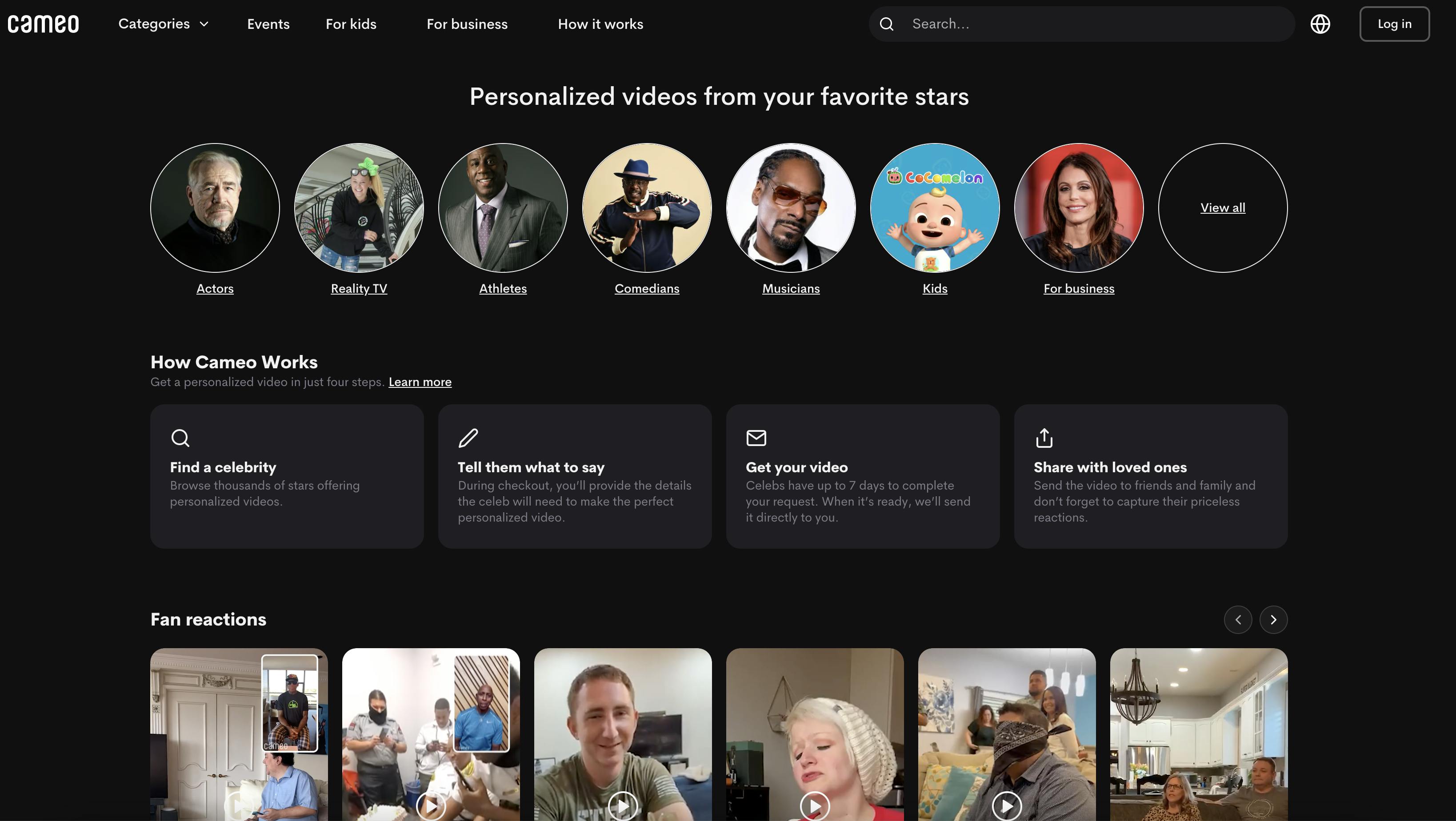
Source: Cameo
Cameo’s primary offering is a personalized video ordering service through which a person can choose a celebrity, submit detailed instructions on what the celebrity should discuss in a video, book the video, and share it. Other features include booking personalized videos on behalf of businesses, live calls with celebrities, and personalized text messages.
Cameo for Business
Launched in 2020, Cameo for Business offers brands of all sizes direct access to tens of thousands of athletes, entertainers, creators, and stars to create celebrity-driven marketing content. Brand customers across every industry, including Infiniti, Chipotle, Bud Light, Molson Coors, MTV, and Pfizer, have used it for social and brand marketing campaigns to connect with core audiences, drive brand awareness and boost sales.
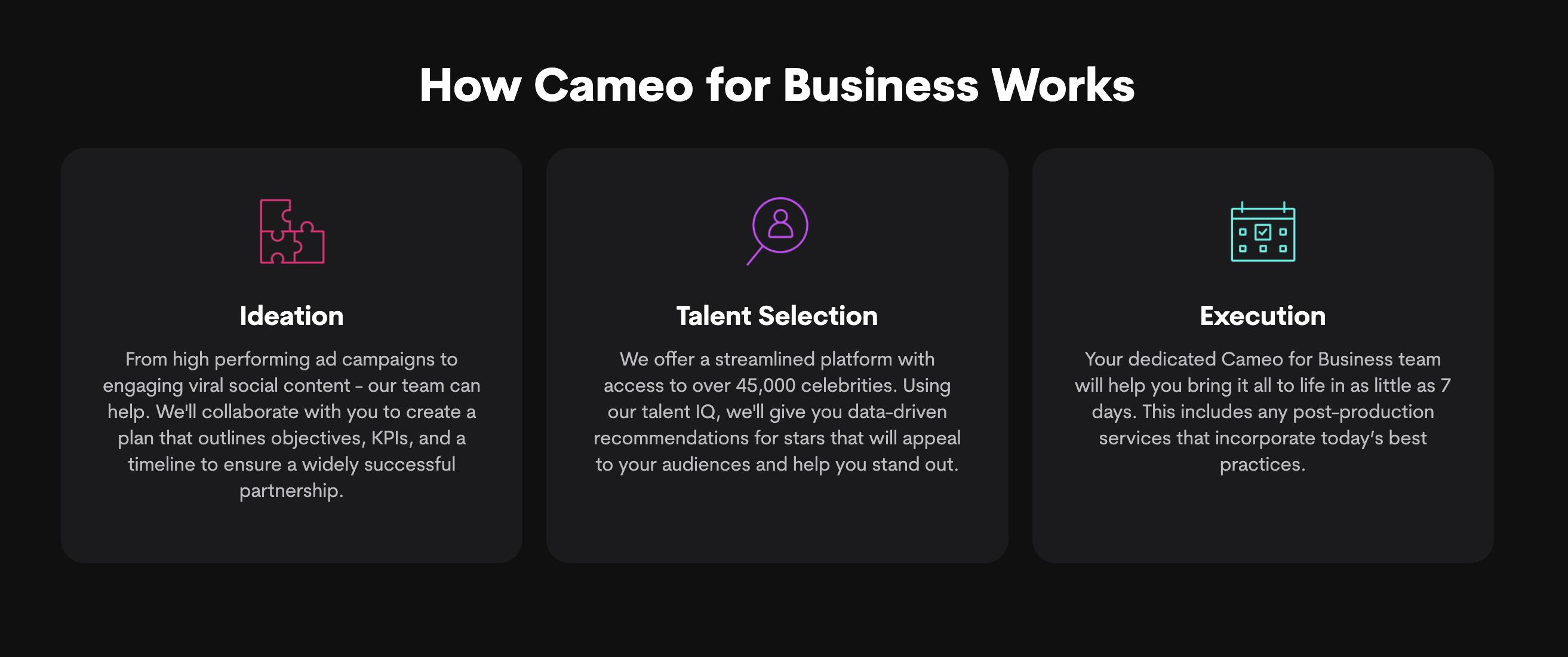
Source: Cameo
Cameo Kids
Cameo also partnered with Candle Media to launch a new feature aimed at children's content, Cameo Kids. The service will offer personalized birthday and holiday video greetings from animated children's characters, including famous figures from Candle Media's Moonbug Entertainment's franchises "Blippi" and "CoComelon."
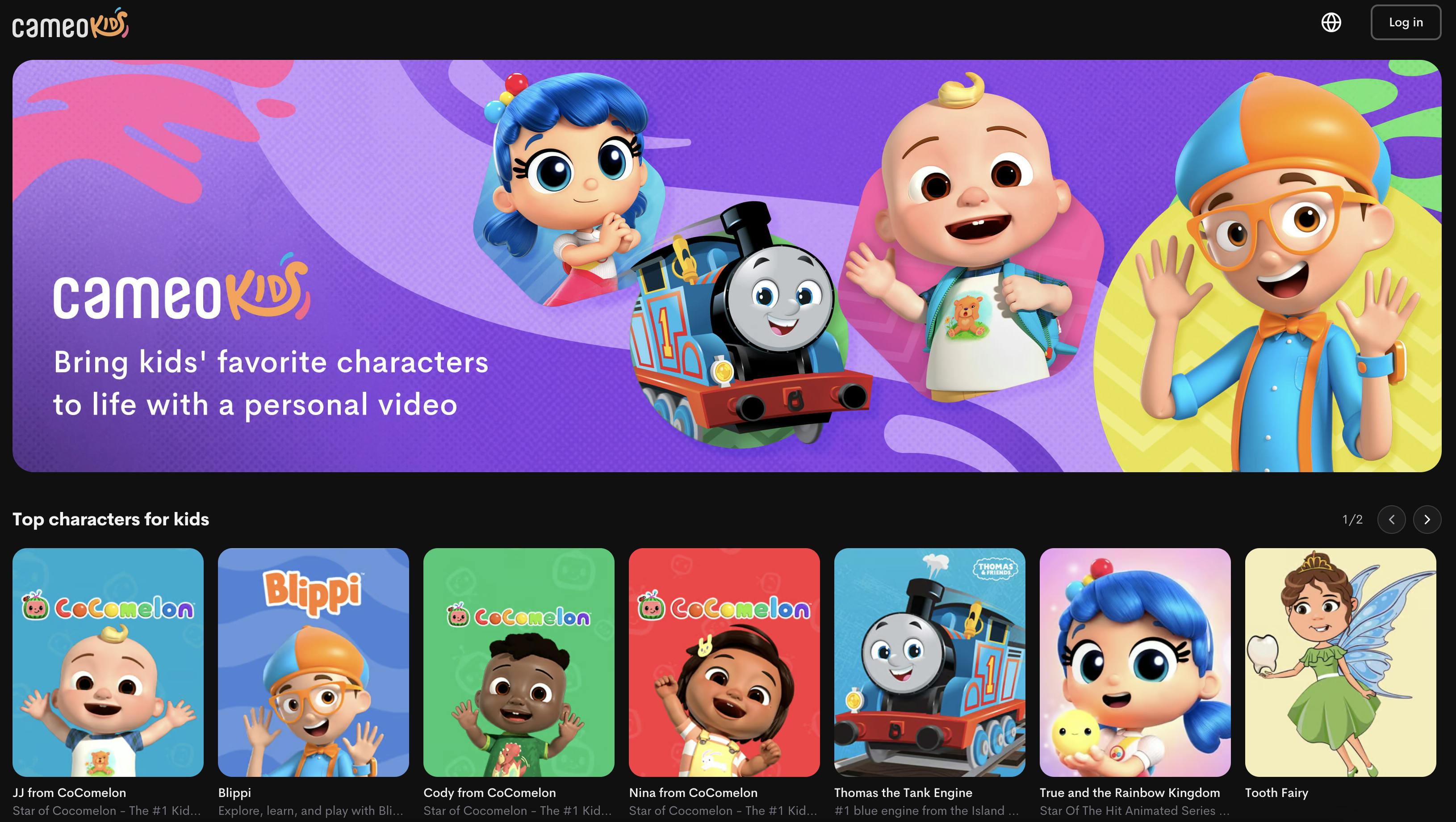
Source: Cameo
Cameo NFTs
In February 2022, the company ventured into Web3 by launching Cameo Pass NFTs, which offered access to exclusive community events. It halted the project about a year after launch.
Market
Customer
As a marketplace, Cameo primarily serves two customer segments: celebrity talent on the supply side, and consumers on the demand side.
On the supply side, Cameo focuses more on attracting a large number of lesser-known, niche celebrity talent with loyal followings, rather than on a small number of A-list stars. This is because lesser-known stars are more willing to spend their time earning money creating content on Cameo at a reasonable price point.
As for the demand side, Cameo’s customers primarily consist of everyday consumers, 80% of whom use the platform for gifting. Cameo also does serve business customers, who use Cameo to connect with its talent network for ad campaigns, social content, events, and more.
Market Size
In October 2022, Cameo CEO Steven Galanis noted that “it’s been widely published that there are 50 million members of the creator economy today,” and that of these, there were 2.5 million people “that could be highly monetizable on Cameo right now.” Galanis also said that he expects this monetizable talent pool to double in the next five years as audiences and followings grow on platforms like TikTok and SoundCloud. “This is a TAM that we think is multiple tens of billions of dollars of TAM globally, and it's just starting,” Galanis concluded.
Two primary talent pools for Cameo are actors and musical artists. IMDb’s filmography statistics list over 37 million actors and 24 million actresses on the site. Spotify has previously estimated some 200K “professional or professionally aspiring” artists worldwide.
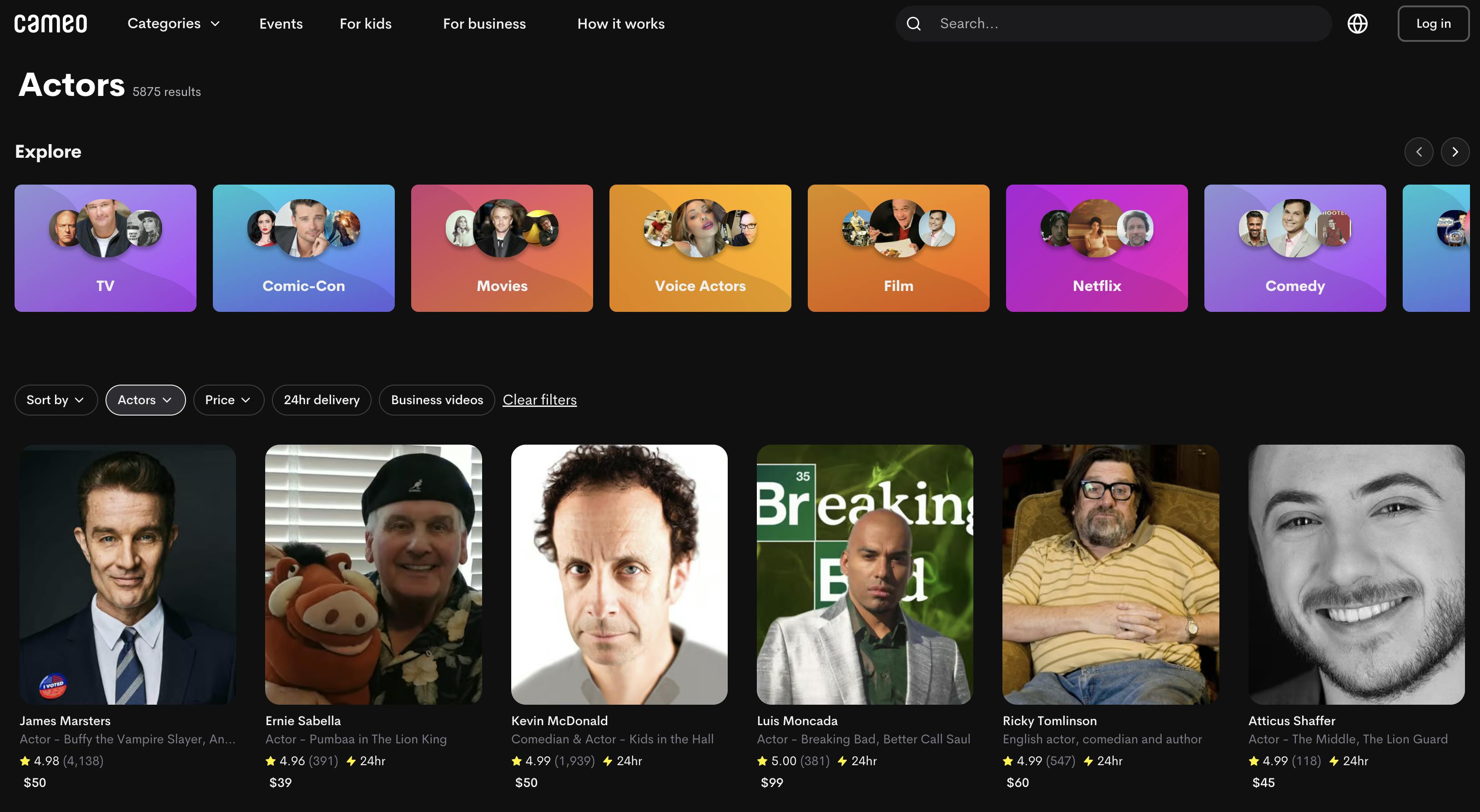
Source: Cameo
Another talent pool for Cameo is athletes. In addition to thousands of athletes across professional sports, last year, the number of college-level student-athletes surpassed 520K — an NCAA record. The NIL market for student-athletes is expected to exceed $1.1 billion in value in 2023, its second year in development. Another important target group for Cameo that is positioned to grow substantially is people who have amassed loyal social media followings. As of July 2022, TikTok had 39K accounts with at least 1 million followers. For comparison, YouTube had 33K such accounts, and Instagram had 23K.
Competition
In October 2022, Cameo CEO Steven Galanis stated that “we [Cameo] tend not to have major competition in the core market.” While Cameo may not have any direct competitors, there are some platforms with the technological infrastructure and creators necessary to compete with Cameo.
TikTok: TikTok has amassed a global monthly active user base of more than 1 billion people. With TikTok’s distribution prowess, it’s not uncommon for an unknown user to go viral overnight and garner a large social media following. Through the platform, many creators, artists, and entrepreneurs have become micro-celebrities among their followers and fans.
In 2021, TikTok began quietly testing a feature called Shoutouts which has similarities to Cameo’s core offering. A description of the feature read, “TikTok Shoutouts is a new functionality which enables TikTok creators to monetize by creating personalized videos to their fans.” However, in 2023 it does not appear Shoutouts has been widely publicized since then.
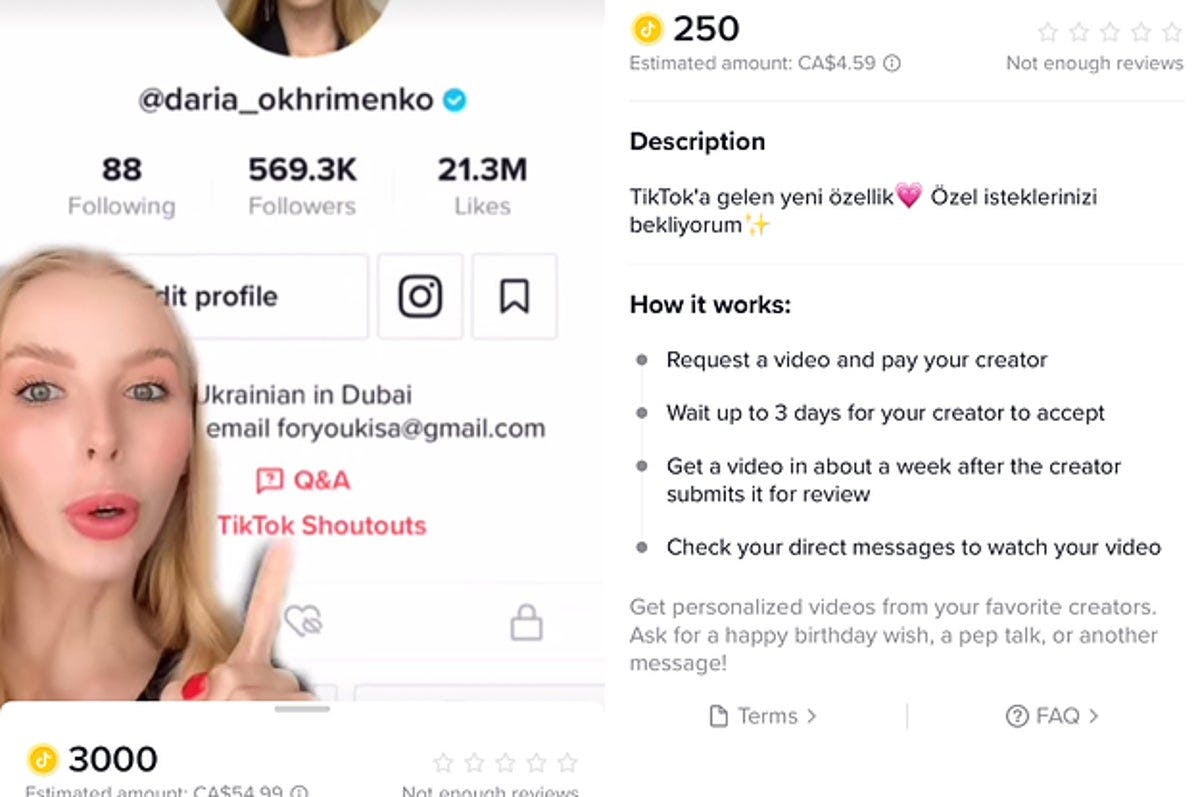
Source: BuzzFeed
memmo.me: memmo.me provides a webpage for offering and distributing personalized video messages from actors, athletes, musicians, and others. It was founded in 2019, is based in Stockholm, and has raised $24 million in funding.
Thrillz: Thrillz is another app that offers personalized celebrity video messages and live experiences. It was founded in 2020, is based in London, and has raised pre-seed financing.
Another class of competition for Cameo includes creator-focused companies like OnlyFans and Patreon, though, like TikTok and YouTube, their business models and selling points are markedly different from Cameo’s. Patreon, for instance, offers a platform for creators to sell memberships for access to exclusive content and connection with their biggest fans. Similar to TikTok, YouTube is positioned to compete with Cameo. The platform already offers a suite of payment tools, and as of December 2021, more than 45K US YouTube channels had at least 100K subscribers.
Business Model
Cameo’s primary business model involves taking a 25% cut from each personalized interaction booked in its marketplace. Over time, Cameo has introduced new paid features, including more expensive live video calls and more affordable personalized text messages, as well as upselling features like 24-hour delivery and personalized handwritten cards.
Cameo for Kids offers personalized videos of animated characters from popular children’s franchises like Blippi, CoComelon, and Thomas the Tank Engine, starting at $25. Cameo also has a premium-priced enterprise tier called Cameo for Business to help brands connect with celebrities and influencers for events, marketing campaigns, product launches, and other similar projects.
Traction
In 2020, Cameo generated $100 million in gross revenue, of which it kept 25% for itself (75% of revenue was paid to talent). That number was up 4.5x year-over-year, which makes it possible to deduce that Cameo made approximately ~$22.2 million in gross revenue in 2019.
In 2021, Cameo acquired Represent, a heavily-automated celebrity marketing and merchandise company, for an undisclosed amount. In May 2022, it was reported that sales had stalled at Cameo in 2021, with the company bringing in roughly $132 million that year between its core business and Represent’s. In 2022, Cameo announced its talent pool had surpassed 50K celebrities.
By February 2022, Cameo for Business saw 500% growth in bookings and 12K customers, and Cameo billed the segment as its “next $100 million business.” In February 2023, Cameo for Business had 14K customers, including Pfizer, Molson Coors, and Chipotle. In 2022, however, Cameo conducted two rounds of layoffs.
Valuation
As of March 2023, Cameo has raised $165.7 million in funding across five rounds.
In 2017, Cameo raised $500K in its initial funding round. In 2018, the company raised $3.2 million in seed funding. In 2018, the company raised $12.5 million in a Series A. In 2019, the company raised a $50 million Series B at $300 million valuation. Most recently, in 2021, the company raised a $100 million Series C at a valuation north of $1 billion.
Cameo’s investors include Kleiner Perkins, Starting Line, UTA, Lightspeed Ventures Partners, Google Ventures, Spark Capital, Headline, SoftBank Vision Fund, Amazon Alexa Fund, Bain Capital, TCG, Jeff Weiner, Tony Hawk, and others.
Key Opportunities
International expansion
As of February 2022, 20% of Cameo orders were made outside the US. That month, the company announced formal plans to expand into Japan through a commercial partnership with SoftBank, which also invested in Cameo. Japan is Cameo’s largest Asian market, and the company also plans to move into more Spanish and French-speaking markets.
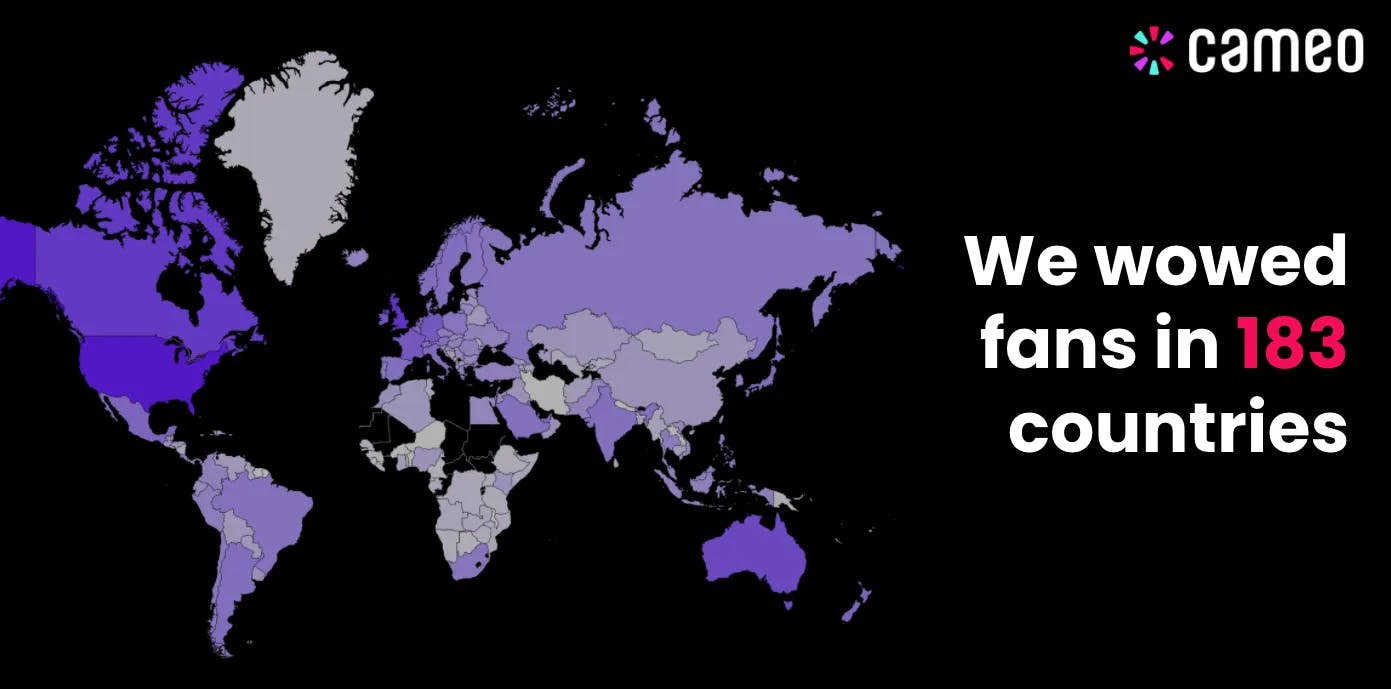
Source: Cameo
With individual markets all boasting their own local talent, and as distribution of foreign media and sports globalizes, Cameo’s platform is well-positioned to capture large shares of the global celebrity talent market.
B2B Offerings
Cameo for Business is the company’s fastest-growing revenue stream. As of February 2023, Cameo for Business had 14K customers, including Pfizer, Molson Coors, and Chipotle. In 2023, Cameo hired Matty de Castro, who led Meta’s CPG and retail sales partnerships and was most recently VP of growth and operations at VidMob, to lead Cameo for Business.
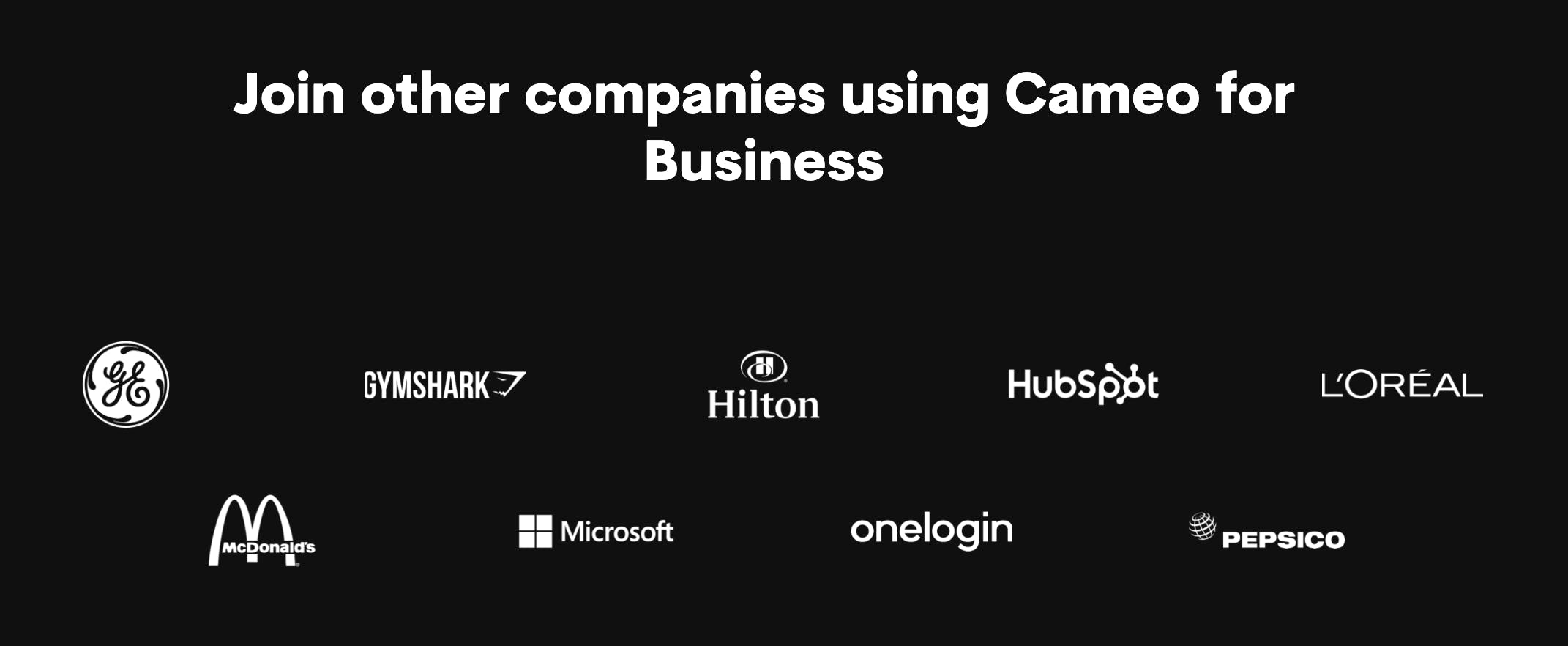
Source: Cameo
Companies may look to Cameo to assist with high-performance marketing campaigns as ad budgets tighten and shift toward short-form, vertical content.
Greater Pool of Athletes
Last year, the number of college-level student-athletes surpassed 520K. The NIL market for student-athletes is forecast to top $1.1 billion in value in 2023, its second year in development. Cameo offers an attractive, familiar way for student-athletes to monetize their followings.
Executing on Cameo for Kids
In 2022, Cameo launched Cameo for Kids in partnership with Candle Media, offering personalized videos of animated characters from popular children's franchises, starting at $25. Because Cameo for Kids leverages AI to generate content, it represents a scalable, high-margin business opportunity for Cameo and its brand partners.
Key Risks
Customer retention
Around 80% of Cameos are purchased as gifts. Diversifying the company’s business away from seasonal purchases is a “$10 billion question for Cameo,” CEO Steven Galanis has said. “We’ve tried to do that through a variety of means, through adding new services to the platform… But right now, it’s still like how do we crack the nut on the core marketplace and get people coming back over and over again?”
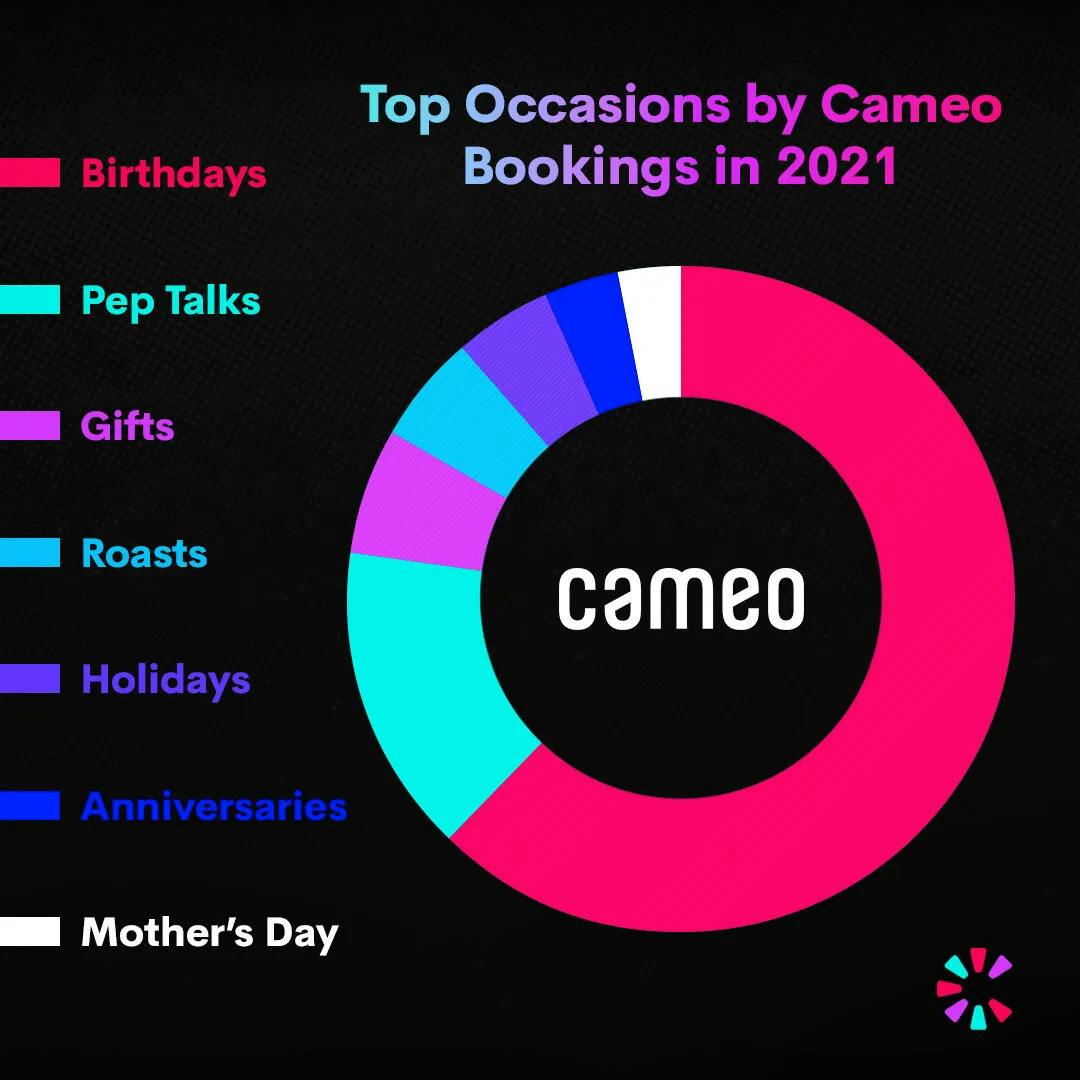
Source: Cameo
If Cameo is unable to diversify its business away from main drivers like birthday gifts, it may struggle to retain customers and grow its users’ lifetime value.
Vertical competitors
CEO Steven Galanis has wondered “if Cameo could be attacked by going hyper-verticalized on a particular niche.” It is possible that vertical competitors could arise based on geography or subject matter, though Galanis considers Cameo’s celebrity diversity a great strength.
Summary
Cameo hopes to capitalize on trends in technology and fame by offering a marketplace where fans and brands can easily book personalized video messages from pop culture, sports, and entertainment personalities. In roughly six years since its founding, Cameo has seen significant traction, hitting the $100 million mark in gross revenue in 2020, building a talent network of more than 50K stars, raising $165.7 million in venture funding, and launching new high-margin, scalable ventures like Cameo for Kids and Cameo for Business.
Cameo may not have any direct competitors, though it risks losing market share to creator platforms like TikTok and YouTube. To maintain a high level of growth, Cameo could expand internationally, further deepen its position in the B2B, children’s entertainment, and sports markets, leverage its Represent acquisition, and diversify its business away from seasonal purchases.





